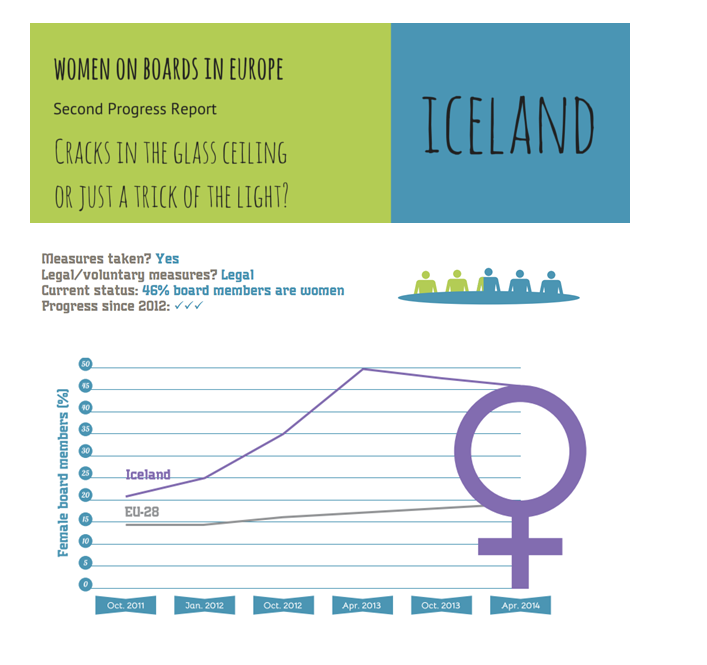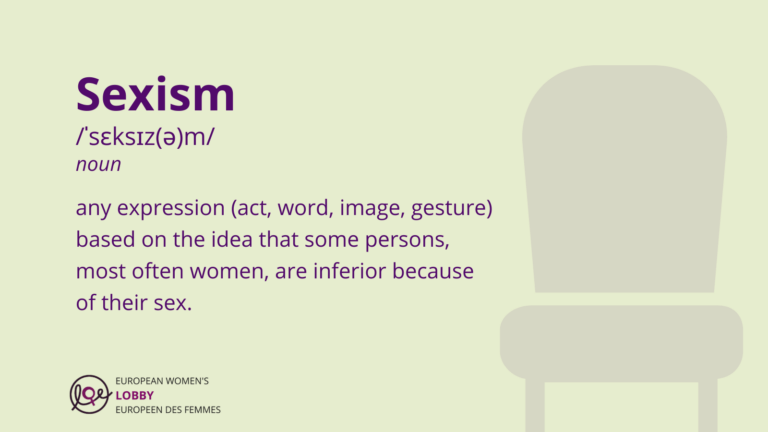What is this report about?
As part of the European Women’s Lobby’s Beijing+20 focus month on ‘Women in Decision-Making’, February sees the launch of the EWL’s latest report on women on boards, entitled ‘Women on Boards in Europe: Second Progress Report. Cracks in the glass ceiling or just a trick of the light?’
This Second Progress Report is part of the EWL’s ongoing work to ensure that parity at all levels of decision-making becomes reality. It tracks developments, progress, and stagnation regarding women on company boards in 11 European countries, including Iceland, since the EWL’s first Progress Report on Women on Boards in 2012 – which was awarded the European Public Affairs Award for Report of the Year 2012.
What’s happening in Europe regarding women on boards?
Since the 2012 report, and ongoing campaigning in favour of binding legislation regarding gender parity on company boards across the EU, an EU Directive which aims to attain a 40% gender balance on non-executive boards in large, publicly listed companies across the EU has been proposed and is currently under consideration by the Council. Commissioner for Gender Equality Věra Jourová has committed to seeing the Directive passed within 2015.
We therefore find ourselves at a key moment to reflect on the developments in this area since 2012 across Europe and to learn from this reflection and analysis in order to best inform current and future policy-making in this area.
What has Iceland done to crack the glass ceiling since 2012?
Positive steps
- In 2008, Iceland passed a law which requires at least 40% of each gender to be represented on boards and in senior management in public corporations
- As a response to the slow rate of change in the private sector, in 2010 the Icelandic government adopted a law on a 40% gender quota for private company boards, which took full effect on 1 September 2013
- As seen in the graph above, there has been a huge increase (25 percentage points) in the proportion of women on company boards in the period Oct 2011 – Apr 2014 – the largest increase seen across the 11 countries studied in this paper and among the 34 countries studied biannually by the European Commission
Challenges
- Reflecting the same pattern as other countries in this report, the female proportion of non-executive directors (46%) is far higher than its executive counterpart (12%)
- While the proportion of female CEOs in Iceland is among the highest in Europe (9%), it is still very low.
National Expert Statement
‘In contrast to other European countries, the number of women on Icelandic business boards is higher in small companies than in the larger ones. While the Icelandic quota laws have been quite successful, there are no penalties for failing to abide by the rules and no request to explain why the rules are not followed. According to opinion polls, people in general support the laws, but women, those with university education and the older generation tend to be most supportive. The general public is more positive towards the legislation than board members. In 2012 only 11% of women board members were critical of the quota legislation compared to 38% of their male counterparts. Nevertheless, almost none of the board members believed the law would have a negative influence on the boards. Female board members are in general younger than male members and women are more likely than men to have a university degree. They also have more diverse degrees. Thus, gender quotas have increased diversity in more fields than gender. It is still too early to see if the gender quotas result in more women being promoted to leading positions in business in general, not only the boardrooms.’
Guðbjörg Linda Rafnsdóttir, Professor of Sociology, University of Iceland, Iceland
The way forward
The report makes five evidence-based recommendations, which should be taken into account as the future policy landscape regarding women in decision-making at the EU level and the national level is determined:
- Binding measures must apply to both executive and non-executive boards
- Further action is needed to increase proportion of female CEOs
- Effective measures require regular monitoring and intermediary targets
- Measures must be enforced with firm sanctions
- Quotas must be introduced as part of a comprehensive policy package that seeks to address the fundamental causes of women’s underrepresentation in economic decision-making
Gender parity in positions of economic power is of vital importance when it comes to justice, democracy and sustainable growth. Diverse decision-makers and leaders better represent, better understand, and better respond to the desires and needs of women and men in their diversity – and will be more open to cultivating a new style of leadership which will lead to much-needed transformative social change. As an important step forward towards a progressive, sustainable and inclusive Europe, the European Women’s Lobby demands the adoption and implementation of the current proposed EU Directive on women on boards without further delay. Moreover, we strongly encourage national governments to go above and beyond its requirements and to implement stronger measures to achieve gender parity at all levels of decision-making.
Sources: European Union, 2012. Exchange of good practices on gender equality: Women in economic decision making. Comments paper – Iceland.



